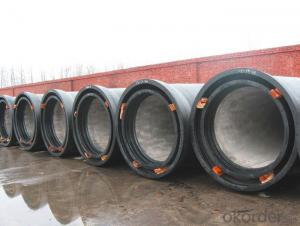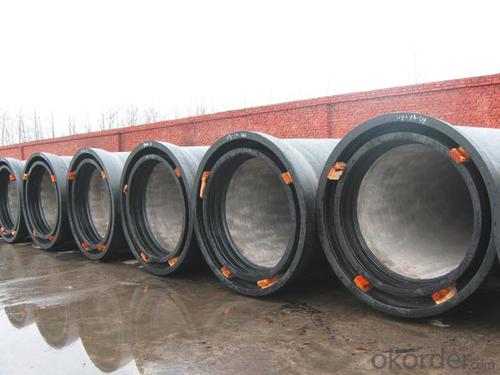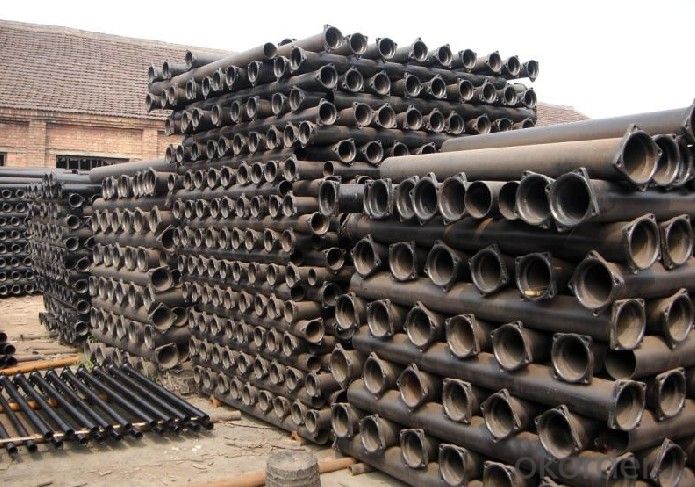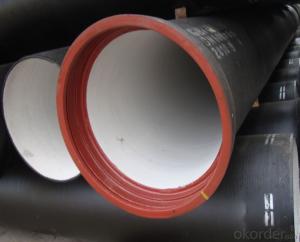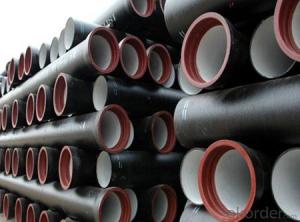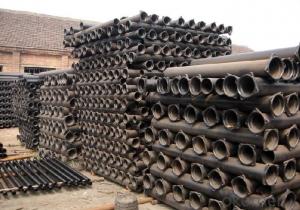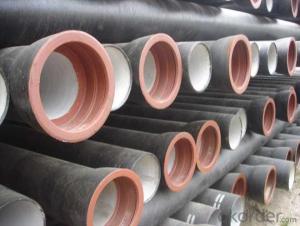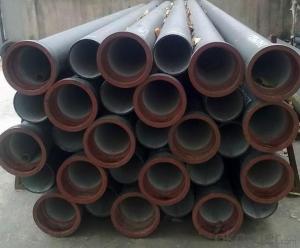Ductile Iron Pipe EN598 DN100-DN700 K9 Top Supplier in China
- Loading Port:
- China main port
- Payment Terms:
- TT or LC
- Min Order Qty:
- 20 m.t.
- Supply Capability:
- 200000 m.t./month
OKorder Service Pledge
OKorder Financial Service
You Might Also Like
1. Ductile Iron Pipe Description :
DI pipe fittings are manufactured according to ISO 2531 or BS EN545 or BS4772 FOR POTABLE WATER ,internal is cement lining or wet epoxy coating;External is zinc plus bitumen or wet epoxy coating. We also manufacture ductile iron fittings with fusion bonded epoxy both inside and outside. All the producets are sutible to water pipes fields.We have passed ISO9001,ISO14001,OHSMS18001 certificate.
2. Main Features of the Ductile Iron Pipe:
2. Standard: ISO 2531, EN545, EN598, ANSI, AWWA
3. Certificate: ISO9001, ISO14001, SGS, NSF, WRAS
4. Test: In accordance with ISO 2531 / EN 545 / EN598 and 100% water pressure test
5. Length: 6m or cut into 5.6m, 5.7m, 5.8m
6. Internal Lining: Cement, conform to ISO4179
7. External coating: Zinc + Bitumen, conform to ISO8179
8. Rubber: NBR, SBR, EPDM according to ISO4633 / EN681.1
9. Note: The gaskets, bolts & nuts are supplied respectively as your special requirement
3. Ductile Iron Pipe Images:
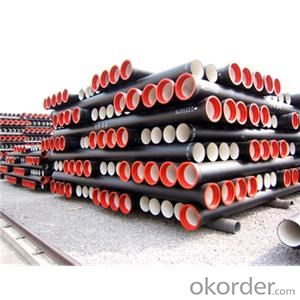
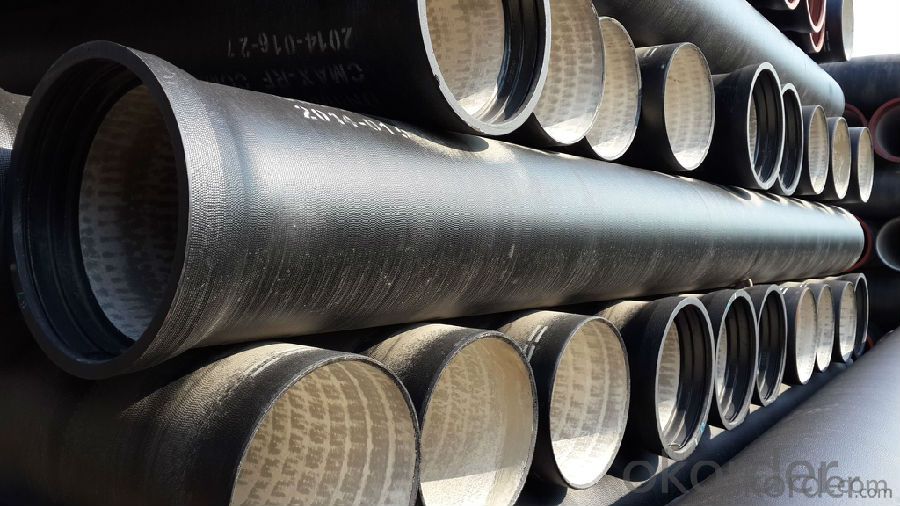
4. Ductile Iron Pipe Specification:
Grade: A53 Grades A/B, ASTM A106 Grades B/C,ASTM A179
AWWA, C200, ASTM A139, ASTM A120, API 5L Grade B
X42, X52, X56, X60, X65, X70, X80, X100
Weld Alternatives: LSAW
OD size range: 6.4~44.5mm
Wall thickness: 406.4~1422mm
Length: 3 - 12 m according to requirment
Note: Other grade can also be provided after consulting. Special design are available
for coal slurry conveyance LSAW line tube
5. FAQ:
We have organized several common questions for our clients,may help you sincerely:
1.Q: Why would you choose ductile iron pipe rather than other pipe materials?
A:The reasons are obvious for that not only ductile iron pipe possesses the inherent strength and flexibility of ductile iron, combined with proven corrosion protection systems, but also the cost savings can be achieved from design to installation and commissioning.
2.Q:Why can you guarantee the inner of pipes can’t be corroded?
A: High alumina cement mortar lining and sulphate-resistant cement mortar lining. These two special linings are applicable to inner anti-corrosion for sewage pipes, improving resistance to erosion of the sewage components.
- Q: What are the different methods for joining ductile iron pipe?
- There are several methods for joining ductile iron pipe, each with its own advantages and limitations. One common method is mechanical joint (MJ) coupling, which involves using a rubber gasket and a set of bolts and nuts to create a watertight seal between pipe sections. This method is relatively quick and easy to install, but it requires a skilled technician to ensure proper alignment and bolt tightening to prevent leakage. Another method is flanged joint, where the pipe ends are equipped with flanges that are bolted together using gaskets to create a tight seal. This method allows for easy disassembly and reassembly of pipe sections, making it suitable for applications that require frequent maintenance or modifications. However, it is more expensive and time-consuming compared to other methods. One widely used method is push-on joint (POJ), which involves using a rubber gasket and a special lubricant to slide the pipe ends together. This method provides a reliable and watertight seal, and it is relatively quick and easy to install. However, it requires proper alignment and care to avoid damaging the gasket during assembly. Another option is restrained joint (RJ), which uses a mechanical joint coupling with additional features to resist axial forces or thrusts. This method is commonly used in applications where the pipe is subject to internal pressure, external loads, or seismic activity. It provides a secure and rigid connection but may require specialized tools and training for installation. Finally, welding is another method for joining ductile iron pipe. It involves heating the pipe ends and melting a filler metal to create a permanent bond. This method provides a strong and durable connection, but it requires skilled welders and additional time for preparation, welding, and cooling. Welding is often used for specific applications, such as joining sections of pipe with different diameters or connecting to other materials. In summary, the different methods for joining ductile iron pipe include mechanical joint coupling, flanged joint, push-on joint, restrained joint, and welding. The choice of method depends on factors such as the application requirements, installation time, maintenance needs, and budget.
- Q: Are ductile iron pipes suitable for mining applications?
- Yes, ductile iron pipes are suitable for mining applications. Ductile iron pipes are known for their strength, durability, and resistance to corrosion, making them ideal for underground mining operations. They can withstand high pressure, heavy loads, and abrasive materials commonly found in mining environments. Additionally, their flexible nature allows for easy installation and maintenance in challenging mining conditions.
- Q: Can ductile iron pipe be used for irrigation pumping stations?
- Indeed, irrigation pumping stations can utilize ductile iron pipe. This type of pipe finds widespread application, particularly in irrigation systems, owing to its robustness and resilience. Its exceptional tensile strength enables it to endure substantial pressure and weight, rendering it highly suitable for irrigation pumping stations. Furthermore, ductile iron pipe exhibits resistance to corrosion, a desirable trait in the presence of water within irrigation systems. Moreover, its ease of installation and maintenance make it an economical selection for irrigation projects.
- Q: What are the different coating thickness options for ductile iron pipe?
- The different coating thickness options for ductile iron pipe vary depending on the specific application and requirements. However, common coating thickness options for ductile iron pipe range from 200 to 400 microns.
- Q: Are ductile iron pipes more resistant to breaks and cracks than other pipe materials?
- Ductile iron pipes generally possess higher resistance to breaks and cracks compared to other pipe materials. Ductile iron, a form of cast iron treated with magnesium, exhibits increased flexibility and reduced brittleness. This enhanced flexibility empowers ductile iron pipes to endure significant pressure and external loads without incurring damage. In contrast to widely-used pipe materials such as PVC, HDPE, or steel, ductile iron pipes excel in strength and durability. They boast higher tensile strength, enabling them to withstand greater forces and pressures without succumbing to failure. Additionally, ductile iron pipes demonstrate superior impact resistance, reducing the likelihood of cracking or breaking when subjected to sudden impacts or external loads. Another advantage of ductile iron pipes lies in their ability to resist corrosion. The material naturally repels rust and remains unaffected by harsh environmental conditions, making it ideal for underground installations or areas with corrosive soils. This corrosion resistance further contributes to the pipes' longevity and overall integrity. Furthermore, ductile iron pipes possess a longer lifespan compared to other pipe materials. They are designed to endure for multiple decades, often exceeding 50 years, with minimal maintenance. This prolonged lifespan decreases the necessity for frequent replacements, resulting in time and cost savings in the long term. However, it is crucial to acknowledge that no material is entirely immune to damage or failure. Proper installation, maintenance, and adherence to industry standards and guidelines are imperative to ensure optimal performance and longevity of ductile iron pipes. Regular inspection and monitoring should also be carried out to identify potential issues or signs of deterioration, facilitating timely repairs or replacements.
- Q: How much is the working pressure of ductile iron pipe used in water supply pipe and how is MPa determined?
- Upstairs are positive solutions, but now outdoor buried water pipes are using steel wire mesh skeleton, plastic composite pipe instead of ductile iron pipeThe general pressure grades used for water supply pipes are 1.0MPa and 1.6Mpa
- Q: What is the maximum temperature that ductile iron pipes can handle?
- The maximum temperature that ductile iron pipes can handle depends on various factors such as the specific grade of ductile iron, the specific application, and the duration of exposure to elevated temperatures. Generally, ductile iron pipes have a maximum recommended operating temperature of around 400-450 degrees Fahrenheit (205-232 degrees Celsius). However, it is important to consult the manufacturer's specifications and guidelines for the specific product being used as different grades and manufacturers may have slightly different temperature limits. It is also crucial to consider the thermal expansion and contraction characteristics of ductile iron pipes to avoid any potential issues in high-temperature environments.
- Q: How much is the installation cost of the ductile iron tube?
- From the hydraulic performance, because ductile pipe specifications generally refers to the inner diameter of PE pipe diameter specifications generally refers to the same specifications, because under the condition of ductile pipe can achieve greater runoff; from the installation and maintenance cost, ductile pipe have more favorable price. The inner wall of zinc spray, anti-corrosion materials such as cement mortar.
- Q: Can ductile iron pipes be used for underground hydropower systems?
- Yes, ductile iron pipes can be used for underground hydropower systems. Ductile iron pipes are known for their strength and durability, making them suitable for various applications, including underground installations. They have excellent resistance to corrosion and can withstand high pressure, making them ideal for carrying water in hydropower systems. Ductile iron pipes also have a long lifespan, reducing the need for frequent replacements and minimizing maintenance costs. Additionally, they have good joint integrity, ensuring leak-free connections underground. Therefore, ductile iron pipes are a reliable choice for underground hydropower systems.
- Q: Are ductile iron pipes resistant to UV radiation?
- Ductile iron pipes do not possess resistance against UV radiation. The exposure to UV radiation can lead to the deterioration and weakening of the material as time goes by. In order to safeguard ductile iron pipes from UV radiation, they must be covered or enveloped with a UV-resistant substance or coated with an appropriate protective layer. Furthermore, it is essential to conduct regular inspections and maintain the pipes adequately to identify and rectify any indications of UV damage.
Send your message to us
Ductile Iron Pipe EN598 DN100-DN700 K9 Top Supplier in China
- Loading Port:
- China main port
- Payment Terms:
- TT or LC
- Min Order Qty:
- 20 m.t.
- Supply Capability:
- 200000 m.t./month
OKorder Service Pledge
OKorder Financial Service
Similar products
Hot products
Hot Searches
Related keywords
